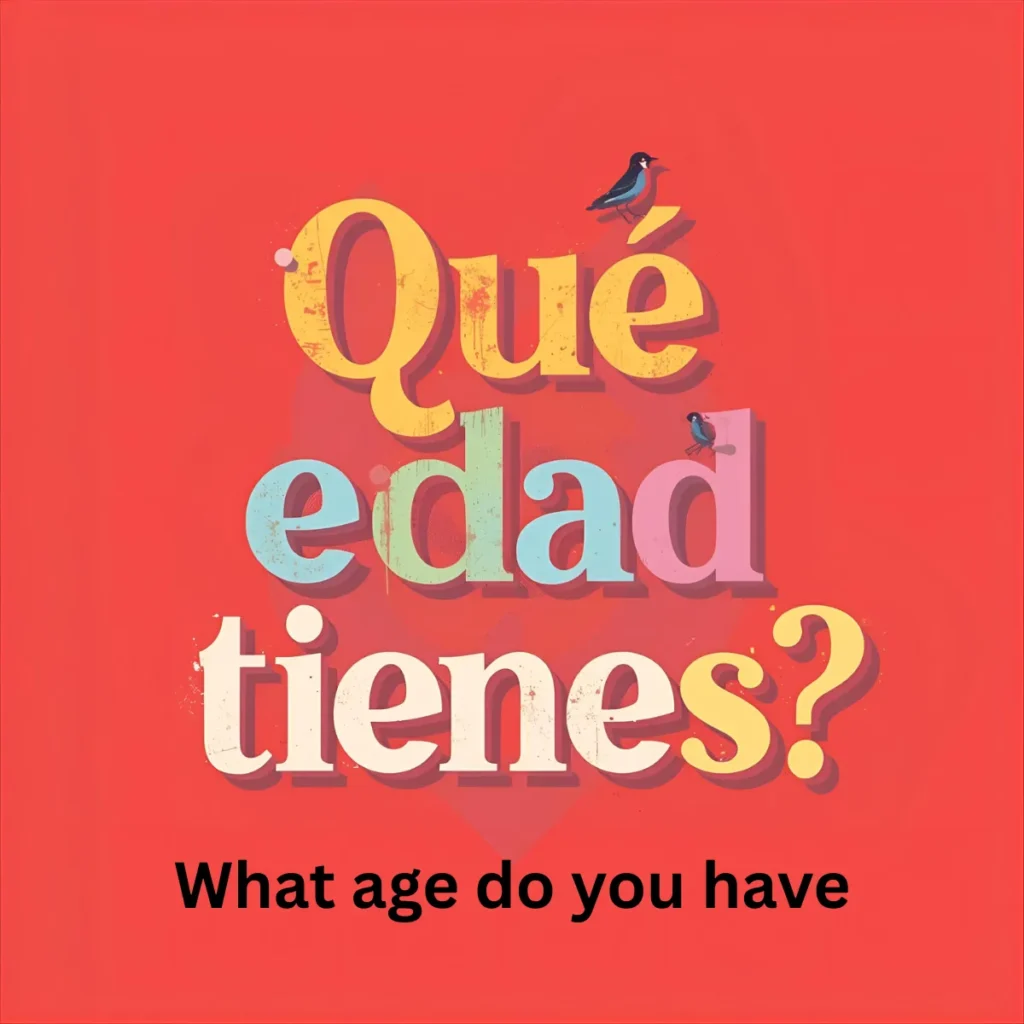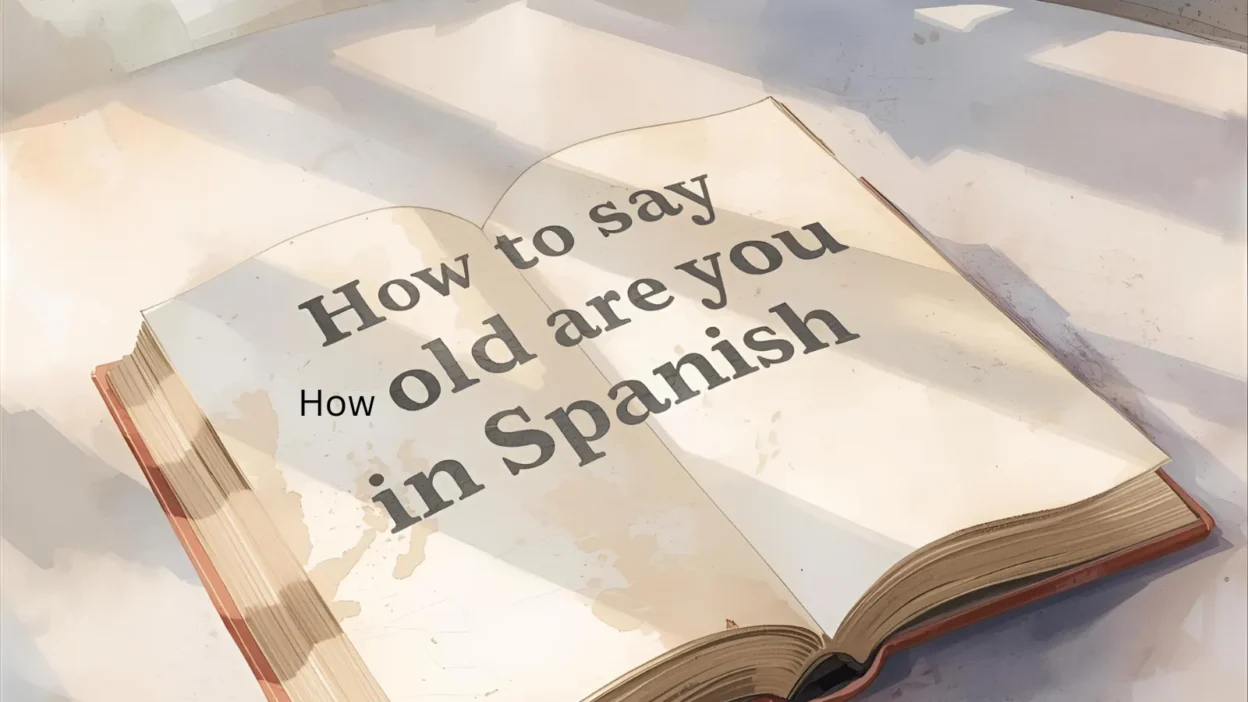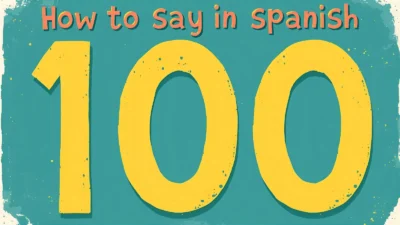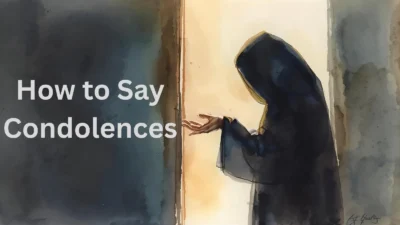Learning how to say how old are you in Spanish is an important step in everyday conversations. The most common phrase is “¿Cuántos años tienes?” which is used in casual settings, while “¿Cuántos años tiene usted?” is the polite, formal version.
Mastering these expressions will help you connect naturally with friends, colleagues, or new people in Spanish-speaking countries. It’s also a great way to practice basic question forms in Spanish.
By learning both casual and formal versions, you’ll be ready for any conversation.
How Old Are You in Spanish
Let’s explore 15 real ways to ask How old are you? in Spanish, complete with conversations and cultural insight!
15 Phrases for How Old Are You in Spanish
| No. | Spanish Phrase | English Meaning | Usage / Context |
|---|---|---|---|
| 1 | ¿Cuántos años tienes? | How old are you? (casual) | With friends, peers |
| 2 | ¿Cuántos años tiene usted? | How old are you? (formal) | Respectful, formal situations |
| 3 | Tengo 20 años. | I am 20 years old. | Standard response |
| 4 | Él tiene 25 años. | He is 25 years old. | Talking about someone else |
| 5 | Ella tiene 18 años. | She is 18 years old. | Talking about someone else |
| 6 | ¿Qué edad tienes? | What’s your age? (casual) | Alternative phrasing |
| 7 | ¿Qué edad tiene usted? | What’s your age? (formal) | Respectful phrasing |
| 8 | Tengo la misma edad que tú. | I’m the same age as you. | Comparing ages |
| 9 | Somos de la misma edad. | We are the same age. | Talking about similarities |
| 10 | ¿A qué edad empezaste a estudiar? | At what age did you start studying? | Broader context |
| 11 | ¿A qué edad se casó? | At what age did they marry? | Formal, storytelling |
| 12 | Tengo más de 30 años. | I am over 30 years old. | Approximate answer |
| 13 | Tengo menos de 18 años. | I am under 18 years old. | Approximate answer |
| 14 | Soy mayor que tú. | I’m older than you. | Comparing ages casually |
| 15 | Soy menor que él/ella. | I’m younger than him/her. | Comparing ages |
1. ¿Cuántos años tienes?
(How many years do you have?)
Origin:
This is the most standard and commonly taught version in all Spanish-speaking countries.
Example:
👤 User A: Hola, ¿cuántos años tienes?
👤 User B: Tengo 22 años.
Use: Neutral and widely accepted in everyday conversations.
2. ¿Qué edad tienes?

(What age do you have?)
Origin:
A more formal or polite alternative to “¿Cuántos años tienes?” Common in written Spanish.
Example:
👤 User A: Disculpa, ¿qué edad tienes?
👤 User B: Tengo 35 años.
Use: Slightly more formal; useful in professional or respectful settings.
3. ¿Tienes cuántos años?
(You have how many years?)
Origin:
A stylistic variation used for emphasis or surprise. More common in spoken language.
Example:
👤 User A: ¿Tienes cuántos años? ¡No lo puedo creer!
👤 User B: ¡Sí! Ya tengo 40.
Use: Expressive or informal tone, usually in response to something surprising.
4. ¿Cuántos añitos tienes?
(How many little years do you have?)
Origin:
Using “añitos” (little years) is a cute or affectionate way to ask a child their age.
Example:
👤 User A: ¡Hola, princesa! ¿Cuántos añitos tienes?
👤 User B: ¡Tengo cinco!
Use: Very informal, sweet — commonly used with kids.
5. ¿Qué tantos años tienes?

(How many years do you really have?)
Origin:
This regional variation appears in places like Mexico. It adds a sense of curiosity or disbelief.
Example:
👤 User A: ¿Qué tantos años tienes para saber tanto de historia?
👤 User B: ¡Tengo solo 18!
Use: Casual, often used when surprised or joking.
6. ¿Cuántos inviernos has vivido?
(How many winters have you lived?)
Origin:
Poetic or philosophical tone—used in literature or very artistic speech.
Example:
👤 User A: Joven sabio, ¿cuántos inviernos has vivido?
👤 User B: Treinta y dos, maestro.
Use: Poetic, literary, or humorous.
7. ¿Y tú, qué edad tienes?
(And you, how old are you?)
Origin:
Often used in return after being asked first. A common conversational follow-up.
Example:
👤 User A: Tengo 29. ¿Y tú, qué edad tienes?
👤 User B: Yo tengo 31.
Use: Friendly and conversational.
8. ¿Cuántos calendarios has roto?
(How many calendars have you torn?)
Origin:
A humorous or metaphorical way to ask someone’s age, implying years have passed.
Example:
👤 User A: Abuelo, ¿cuántos calendarios has roto?
👤 User B: ¡Más de 80!
Use: Joking or used playfully with older people.
9. ¿Cuántos años cargas?
(How many years do you carry?)
Origin:
Used in some Latin American countries like Colombia and Venezuela. It emphasizes age as a burden or experience.
Example:
👤 User A: Don Pedro, ¿cuántos años carga ya?
👤 User B: Ochenta y cinco, joven.
Use: Regional and respectful.
10. ¿Cuál es tu edad?
(What is your age?)
Origin:
Direct but very formal, similar to official forms or documentation.
Example:
👤 User A: Para el formulario, ¿cuál es tu edad?
👤 User B: Treinta y seis años.
Use: Official or bureaucratic settings.
11. ¿Ya cumpliste años?
(Did you already have your birthday?)
Origin:
Frequently used in Latin America when checking if someone just had a birthday.
Example:
👤 User A: ¿Ya cumpliste años este mes?
👤 User B: Sí, el 15 de junio.
Use: Common with friends and family, implies closeness.
12. ¿Tú cuántos?
(And you, how many?)
Origin:
An abbreviated and informal way to ask age in response to someone else’s answer.
Example:
👤 User A: Yo tengo 28. ¿Tú cuántos?
👤 User B: ¡30 recién cumplidos!
Use: Very casual; friendly dialogue.
13. ¿A qué edad estás?
(What age are you at?)
Origin:
Regional usage, particularly in some parts of Central America or the Caribbean.
Example:
👤 User A: ¿Y tú, a qué edad estás ahora?
👤 User B: A los 25, todavía joven.
Use: Less common; regional and informal.
14. ¿Qué edad tienes tú?
(What age do you have?)
Origin:
A slight emphasis on “tú” for clarity or politeness.
Example:
👤 User A: Me parece que eres menor… ¿Qué edad tienes tú?
👤 User B: Tengo 19, pero parezco menos.
Use: Conversational; gentle emphasis.
15. ¿Ya pasaste los veinte?
(Have you already passed twenty?)
Origin:
A subtle way to ask if someone is older than a certain age, often used humorously.
Example:
👤 User A: ¿Ya pasaste los veinte o sigues en los teens?
👤 User B: ¡Ya voy para 24!
Use: Playful, semi-serious tone among friends.
FAQs
1. How do you say “How old are you?” in Spanish?
You say ¿Cuántos años tienes?
2. How do I pronounce “¿Cuántos años tienes?”?
It sounds like: kwan-tos ah-nyos tyeh-nes
3. Is this phrase formal or informal?
¿Cuántos años tienes? is informal. Use it with friends or people your age.
4. What is the formal version of “How old are you?”
Formal: ¿Cuántos años tiene usted?
5. How do I answer if I am 20 years old?
Say: Tengo 20 años (I am 20 years old).
6. Why does it say “I have 20 years” instead of “I am 20”?
Because in Spanish, you “have” years, you don’t “be” years.
7. How do I ask a child “How old are you?”
You can still use ¿Cuántos años tienes? with kids.
8. Can I just say “años” without “cuántos”?
No ❌ — you must use the full phrase ¿Cuántos años tienes? for it to make sense.
9. How do I ask “How old are they?”
Say: ¿Cuántos años tienen?
10. How do I ask “How old is he/she?”
Say: ¿Cuántos años tiene él/ella?
Conclusion:
Knowing how to say how old are you in Spanish allows you to ask and answer age-related questions confidently. Whether you use the casual ¿Cuántos años tienes? or the respectful ¿Cuántos años tiene usted?, these phrases will help you sound polite and natural. It’s a simple yet essential part of daily conversations in Spanish.

Sophia Mitchell is a passionate content writer known for creating clear, engaging, and informative articles.
She focuses on delivering well-structured content that is easy for readers to understand and trust.
Sophia Mitchell currently contributes quality writing to repliesnest.com, helping readers find accurate answers quickly.



